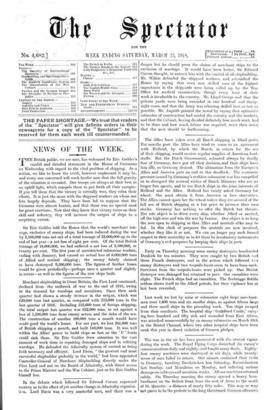Merchant shipbuilding in Great Britain, the First Lord continued, declined
from the outbreak of war to the end of 1915, owing to the demand for warships and munitions. Since then each quarter had shown a steady increase in the output, which was 420,000 tons last quarter, as compared with 213,000 tons in the last quarter of 1916. Including 512,000 tons of foreign shipping, the total output last quarter was 932,000 tons, to set against a loss of 1,200,000 tons from enemy action and the risks of the sea. The construction of another 100,000 tons a month would have made good the world's losses. For our part, we lost 261,000 tons of British shipping a month, and built 140,000 tons. It was well within the Allies' power to build ships as fast as the ' U '-boats could sink them. Sir Eric Geddes drew attention to the vast amount of work done in repairing damaged ships and in refitting warships. He defended the Admiralty system of control as being both necessary and efficient. Lord Pirrie, " the greatest and most successful shipbuilder probably in the world," had been appointed Controller-General of Merchant Shipbuilding directly under the First Lord and not on the Board of Admiralty, with direct access to the Prime Minister and the War Cabinet, just as Sir Eric Geddes himself has.


































